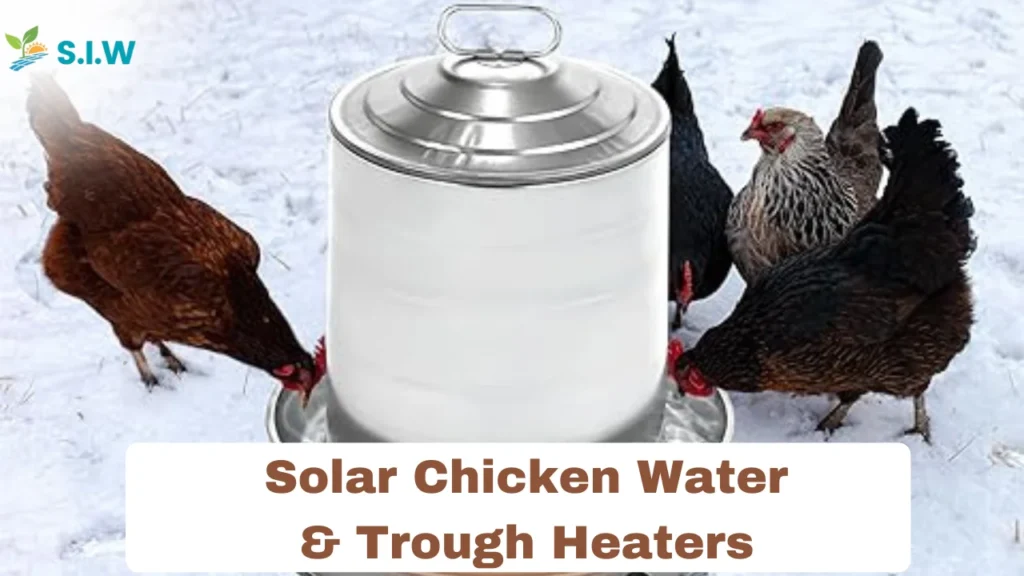If you keep chickens, you know how important it is to keep their water from freezing during cold months. Solar chicken water heaters make this easier without adding extra electricity costs. They use the sun’s power, making them eco-friendly and reliable.
In my experience, finding a way to prevent chicken water from freezing was a struggle. Electrical heaters added to the utility bill, and basic insulation wasn’t enough on the coldest nights. This is where solar water heaters came in handy. Not only are they cost-effective, but they’re also easy to set up in different areas of the coop.
How Do Solar Chicken Water Heaters Work?
Using Solar Energy to Maintain a Steady Temperature
Solar heaters collect sunlight and turn it into heat. A 600 Watt Solar Panel can capture a lot of solar energy, making it ideal for powering these water heaters. When connected to a 3kW Solar Panel System, it provides consistent power to keep water warm, even during cloudy days.
The process is simple. Solar panels absorb sunlight and convert it into usable energy. This energy powers the heater, which keeps the water just warm enough to prevent freezing but not hot enough to harm the chickens.
Personal Experience with Solar Water Heaters
A few winters ago, I used a solar water heater for the first time. My chickens had been struggling because the water would freeze every night, even with basic insulation. Switching to a solar heater solved this problem. I installed a commercial solar panel setup, which gave me enough energy to power the water heater consistently.
Installing the solar panel was easier than I thought, and it’s been saving me money on my electric bill ever since. The chickens also seem more comfortable, and I have peace of mind knowing their water won’t freeze overnight.
Benefits of Solar Chicken Water & Trough Heaters
1. Cost Savings on Electricity
With solar power, there’s no need to worry about the rising costs of electricity. Commercial solar panels harness free energy from the sun, which powers the heaters. This setup saves money in the long run.
2. Environmentally Friendly Choice
Solar energy doesn’t produce emissions, so it’s an eco-friendly option. Using solar panels is an excellent way to reduce your carbon footprint while caring for your chickens.
3. Reliable in Cold Weather
Solar chicken water heaters provide reliable heat during winter, keeping water from freezing. This means you don’t have to worry about your flock’s water supply, no matter how low the temperature drops.
4. Low Maintenance
Once installed, solar water heaters require minimal upkeep. Occasionally, I clean the 600 Watt Solar Panel to ensure it’s getting enough sunlight, but other than that, there’s no ongoing maintenance.
Setting Up Solar Chicken Water & Trough Heaters
1. Choosing the Right Location for Solar Panels
For the best results, place solar panels in an area that receives direct sunlight. Positioning them on a rooftop or in an open space can help maximize energy absorption.
2. Connect the Heater to the Trough
Attach the water heater to the trough where your chickens drink. Make sure the setup is secure and that the heater isn’t overheating the water.
3. Consider a Battery for Backup
For colder climates, adding a battery to store solar energy can ensure the heater continues to work even on cloudy days. This is especially helpful if you experience long, cold winters.
Types of Solar Water Heaters for Chicken Coops
Portable Solar Heaters
Portable solar heaters are easy to set up and move around. They’re great if you need flexibility in your setup or have a small coop. These heaters can connect to a 400 Watt Solar Panel for efficient heating.
Stationary Solar Heaters
Stationary heaters are more powerful and ideal for larger coops. They typically connect to a 3kW Solar Panel System for consistent power. These heaters are a better choice for those with large flocks or more extreme winter conditions.
Why Solar Water Heaters Are Better Than Electric Options
Lower Costs Over Time
While electric heaters are common, they can add up in terms of energy costs. Solar options are more affordable because they use free, renewable energy from the sun.
Increased Safety for Animals
Electric heaters pose a risk of overheating, especially if left on for too long. Solar heaters maintain a steady, low level of warmth, which is much safer for chickens and other animals.
Greater Sustainability
Solar power is sustainable, unlike fossil fuels or other energy sources. By switching to solar, you’re contributing to a cleaner planet while also ensuring your chickens have what they need.
FAQs
Q1: How much sunlight is needed for a solar chicken water heater to work?
A: A 600 Watt Solar Panel works best with at least 6 hours of direct sunlight. For areas with limited sunlight, adding a battery can help store energy.
Q2: Are solar chicken water heaters safe for winter use?
A: Yes, these heaters are designed to keep water warm without overheating. They work well even in freezing temperatures, ensuring your chickens have access to water.
Q3: Do solar heaters require a lot of maintenance?
A: Solar heaters need minimal maintenance. Just clean the solar panels occasionally to ensure they’re getting enough sunlight.
Q4: Can solar heaters power larger troughs for bigger animals?
A: Yes, a 3kW Solar Panel System can power larger heaters, making them suitable for larger troughs used by bigger animals like cattle.
Q5: Is it expensive to switch to a solar chicken water heater setup?
A: While the initial cost can be higher, solar heaters save money on electricity in the long run, making them a cost-effective choice over time.








